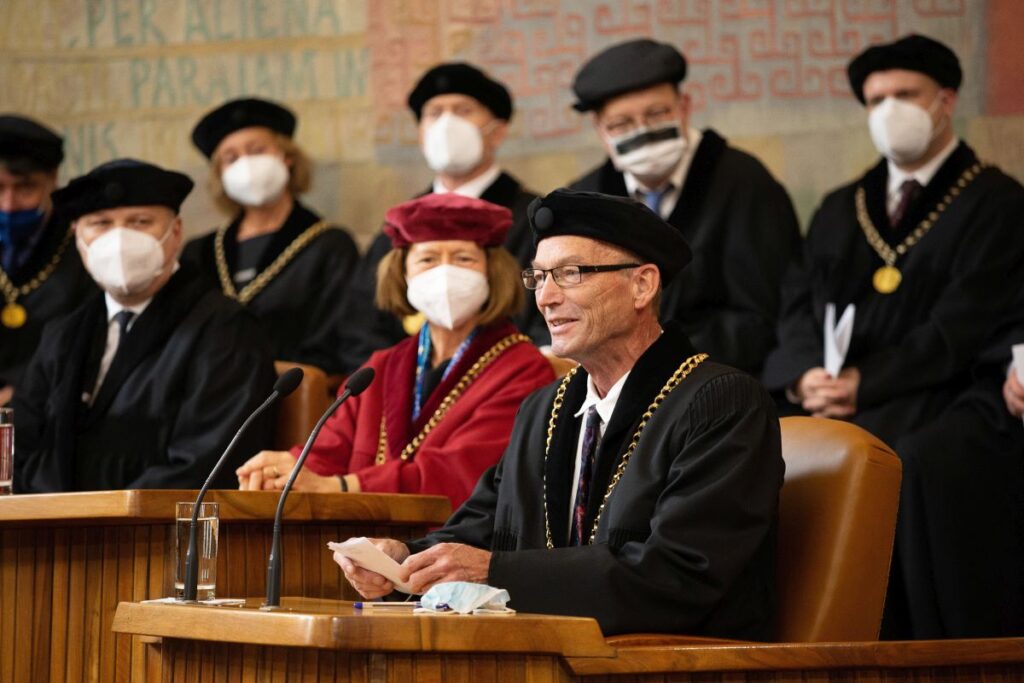Professor Thomas Hylland Eriksen received an honorary doctorate from Charles University
Marek Jakoubek
One of the most famous and influential social anthropologists of the last decades, professor of anthropology at the University of Oslo, Thomas Hylland Eriksen, received an honorary doctorate from the hands of the Rector of Charles University on 22 September 2021 in the Karolinum Auditorium. The initiative to award this honorary doctorate came from the Institute of Ethnology, Faculty of Arts of Charles University.

Geir Thomas Hylland Eriksen was born on February 6th, 1962, in Oslo, Norway. While he spent his high school years dreaming of becoming a novelist or an environmental activist, his plans changed when he started university and immersed himself in three disciplines at once: philosophy, sociology, and anthropology. Anthropology was the field that won out, and in 1987 he earned his master’s degree in the subject from the University of Oslo; in 1991 he received his doctorate in social anthropology from the same institution. In 1995, when he was 33 years old, he became a professor in the Department of Social Anthropology at his alma mater – a position he holds to this day.
He earned the attention and respect of the broader academic community in 1993 with his book Ethnicity and Nationalism, which focuses on nationalism and ethnicity within the field of anthropology and related disciplines. The book quickly became one of the most cited works on the subject, has been reprinted a number of times, and has been translated into multiple languages. A similar response that significantly exceeded the boundaries of both the field and the academic community, was soon aroused by his introduction to social and cultural anthropology Small Places – Large Issues (1995; 4th ed. 2014), which is now – in new appearing editions – one of the most popular introductions to social and cultural anthropology. A History of Anthropology, that T. H. Eriksen wrote together with Finn Sivert Nielsen in 2001, became a certain – equally successful – pendant of this work.
In the mid-80s, Professor Eriksen began his field research in Trinidad and Mauritius, focusing on identity politics, processes of globalization, and multiculturalism (1988, 1992, 1998). And it is the issue of globalization and the interconnecting world that became another domain in which Eriksen has developed his research skills (2007). And in this case it was not a purely academic endeavour, as he often entered into public debates on these topics, seeing public engagement as a responsibility, if not a requirement, for social scientists. Just as he has sought to enrich the public dialogue with the professional insights of his academic discipline, he has also striven to ensure that anthropology considers and addresses the pressing issues of the day. These efforts have made him one of the most recognizable faces of social and cultural anthropology. At the same time, however, he has not neglected his professional audience; in his book Engaging Anthropology (2006), for example, he shows precisely the potential for using expert knowledge to resolve broad social issues. Through his persistent efforts to keep in touch with the issues of the contemporary world, professor Eriksen has become a model of the modern academic.
The worldwide success of his work, especially his research into collective identities in a wide variety of contexts, together with his public engagement, have made Professor Eriksen one of the best-known anthropologists of his generation. Here in his home continent, his reputation was confirmed in 2015 when he was elected president of the European Association of Social Anthropologists (EASA). After his two-year term in this crucial position, he went on to served two more years as the vice president of the association.
Professor Eriksen is the author of more than twenty books, and they have been translated into more than thirty languages. At Charles University I was the most fortunate one, as in 2019 I had the privilege to coedit with Professor Eriksen a book: Ethnic Groups and Boundaries Today: A Legacy of Fifty Years,that summarizes the evolution of the concepts of ethnicity within the last half century. All his publications have received favourable professional responses and commercial publishing success.
Although Professor Eriksen’s professional career is in full swing and we clearly still have much to see from him, the quality and amount of work he has already produced is extraordinary. We can see this from his countless professional contributions (of all genres and styles), from the thousands of citations of his works, from his many keynote speeches delivered throughout the world, the awards he has received, and his work on multiple editorial boards. Professor Eriksen has made significant contributions to the advancement of anthropological discourse in so many fields – ethnicity and nationalism, identity politics and multiculturalism, as well as the history and theory of anthropology. He has become one of the most public faces of social and cultural anthropology, contributing to debates on contemporary society and the world of today. He is one of the most important anthropologists in Europe and the world. The honorary doctorate of Charles University is a fully deserved award for his work.
References
Eriksen, Thomas H. – Jakoubek, Marek, eds. 2019. Ethnic groups and boundaries today. A legacy of fifty years, London: Routledge.
Eriksen, Thomas Hylland. 2007 (2nd ed. 2014, London: Routledge). Globalization: The Key Concepts. Berg Publishers.
Eriksen, Thomas Hylland. 2006. Engaging Anthropology: The Case for a Public Presence. Oxford: Berg Publishers.
Eriksen, Thomas Hylland & Finn Sivert Nielsen. 2001. A History of Anthropology. London: Pluto.
Eriksen, Thomas Hylland. 1998. Common Denominators: Ethnicity, nation-building and compromise in Mauritius. Oxford: Berg Publishers.
Eriksen, Thomas Hylland. 1995. Small Places, Large Issues: An Introduction to Social and Cultural Anthropology.
Eriksen, Thomas Hylland. 1992. Us and Them in Modern Societies: Ethnicity and Nationalism in Mauritius, Trinidad and Beyond. Oslo: Scandinavian University Press.
Eriksen, Thomas Hylland. 1988. Communicating cultural difference and identity. Ethnicity and Nationalism in Mauritius. (Occ. Papers, 16). Oslo: Department of Social Anthropology.